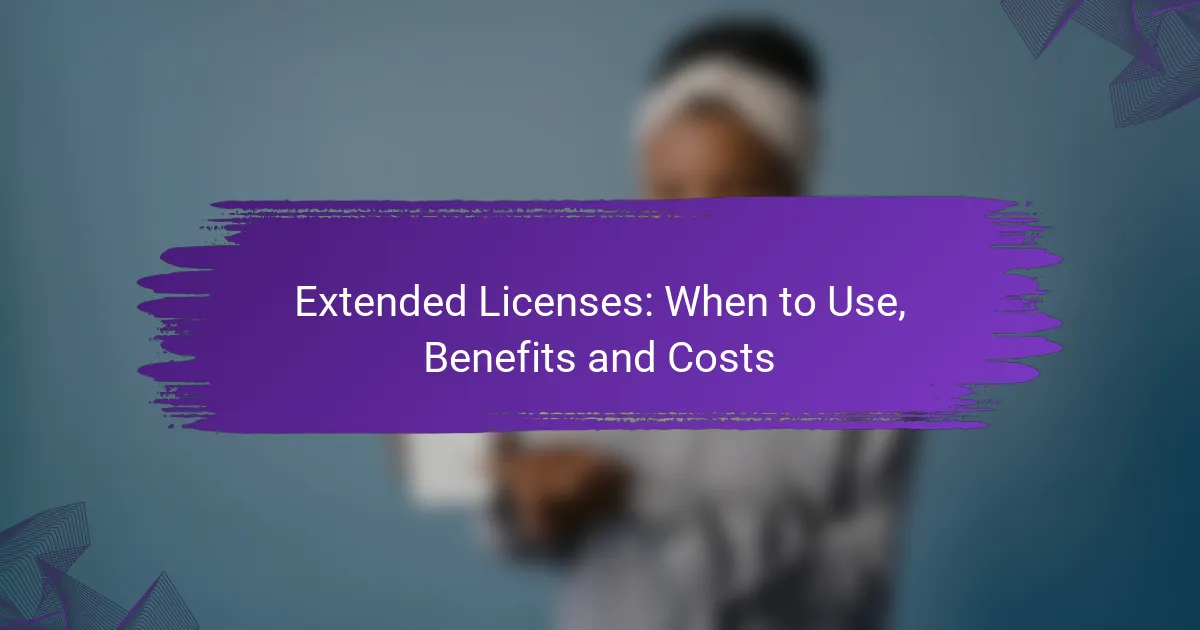Extended licenses are crucial for those seeking broader usage rights for creative assets, particularly in commercial settings or high-traffic platforms. They offer significant advantages, including enhanced legal protection and access to exclusive content, making them a worthwhile investment for businesses and creators. However, the costs can vary widely, often ranging from a few hundred to several thousand dollars, depending on the specific terms and content involved.
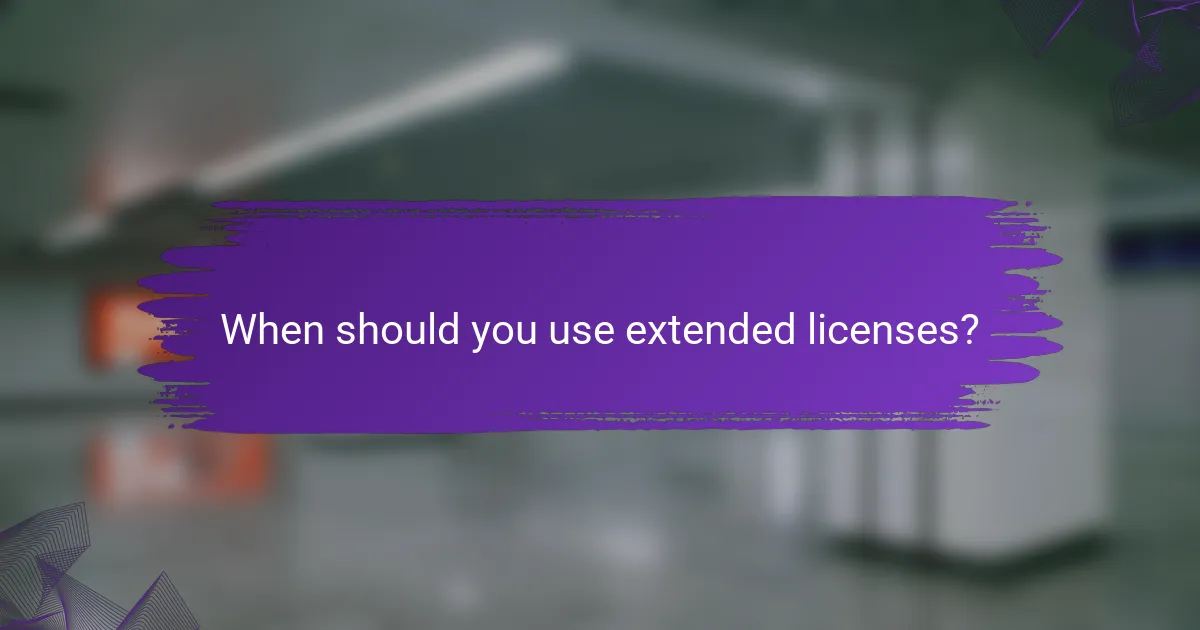
When should you use extended licenses?
Extended licenses are essential when you need broader usage rights for creative assets beyond standard limitations. They are particularly beneficial for commercial applications, high-traffic platforms, merchandise, multimedia projects, and long-term usage scenarios.
For commercial projects
When engaging in commercial projects, an extended license allows you to use assets in a way that generates revenue. This includes advertising campaigns, product packaging, and promotional materials. Without an extended license, you may face legal restrictions on how you can utilize the content.
Consider the potential return on investment when purchasing an extended license. Weigh the costs against the expected revenue from your commercial endeavors to ensure it aligns with your budget.
For high-traffic websites
If your website attracts a significant number of visitors, an extended license is advisable. Standard licenses often limit the number of views or impressions, which can be restrictive for popular sites. An extended license provides peace of mind, allowing you to serve content without worrying about exceeding usage caps.
Evaluate your website’s traffic patterns and choose an extended license if you anticipate growth or sustained high traffic. This proactive approach can save you from potential legal issues down the line.
For merchandise and resale
Using creative assets on merchandise, such as t-shirts or mugs, requires an extended license. This type of license grants you the rights to reproduce and sell products featuring the content. Standard licenses typically do not cover resale, making extended licenses a necessity for commercial merchandise.
Before proceeding, ensure that the extended license explicitly allows for merchandise use. This will protect you from copyright infringement claims and ensure compliance with licensing terms.
For multimedia content
Extended licenses are crucial when incorporating assets into multimedia projects, such as videos, podcasts, or presentations. These projects often have broader distribution and visibility, necessitating more extensive rights than what standard licenses provide.
Assess the distribution channels for your multimedia content. If it will be published on platforms like YouTube or used in commercial settings, an extended license will safeguard your use of the assets.
For long-term usage
If you plan to use creative assets over an extended period, an extended license is the best choice. It provides ongoing rights without the need for renewal or additional fees, making it cost-effective for long-term projects.
Consider your project’s lifespan and potential changes in usage. An extended license can offer flexibility for future adaptations or expansions, ensuring you remain compliant with licensing agreements.
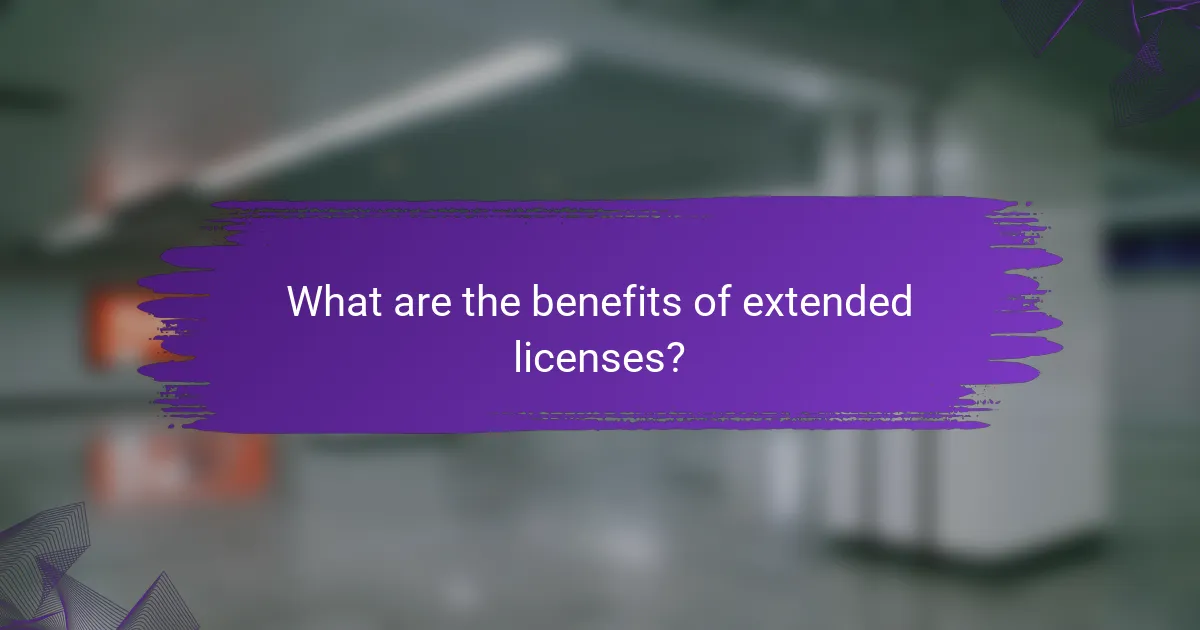
What are the benefits of extended licenses?
Extended licenses provide users with additional rights and protections that standard licenses do not offer. These benefits often include broader usage rights, increased legal protection, enhanced brand credibility, and access to exclusive content, making them a valuable investment for businesses and creators.
Broader usage rights
Extended licenses typically grant more extensive usage rights compared to standard licenses. This can include the ability to use the content in commercial projects, advertising, or even in products for resale. For example, while a standard license may limit usage to personal projects, an extended license allows for broader applications, which can significantly increase the value of the content.
When considering an extended license, evaluate the specific usage rights it offers. Ensure that these rights align with your intended use, as this can save you from potential legal issues and additional costs in the future.
Increased legal protection
With an extended license, you often receive enhanced legal protection against copyright claims. This means that if a dispute arises regarding the use of the content, you are more likely to be covered legally. The additional terms in an extended license can help safeguard your investment and provide peace of mind.
It’s crucial to read the legal terms carefully to understand the extent of the protection offered. This can include clauses that limit liability or provide indemnification, which can be particularly beneficial for businesses operating in competitive markets.
Enhanced brand credibility
Using content under an extended license can enhance your brand’s credibility. It signals to clients and customers that you are committed to using high-quality, legally obtained materials. This can improve your reputation and foster trust, which is essential in building long-term relationships.
Consider showcasing your use of licensed content in your marketing materials. Highlighting that you use extended licenses can differentiate your brand from competitors who may not prioritize legal compliance.
Access to exclusive content
Extended licenses often provide access to exclusive content that is not available under standard licenses. This can include premium images, videos, or other media that can set your projects apart from others. Having unique content can be a significant advantage in crowded markets.
When evaluating content options, look for extended licenses that offer exclusive materials relevant to your industry. This can enhance your creative projects and provide a competitive edge that standard content cannot offer.
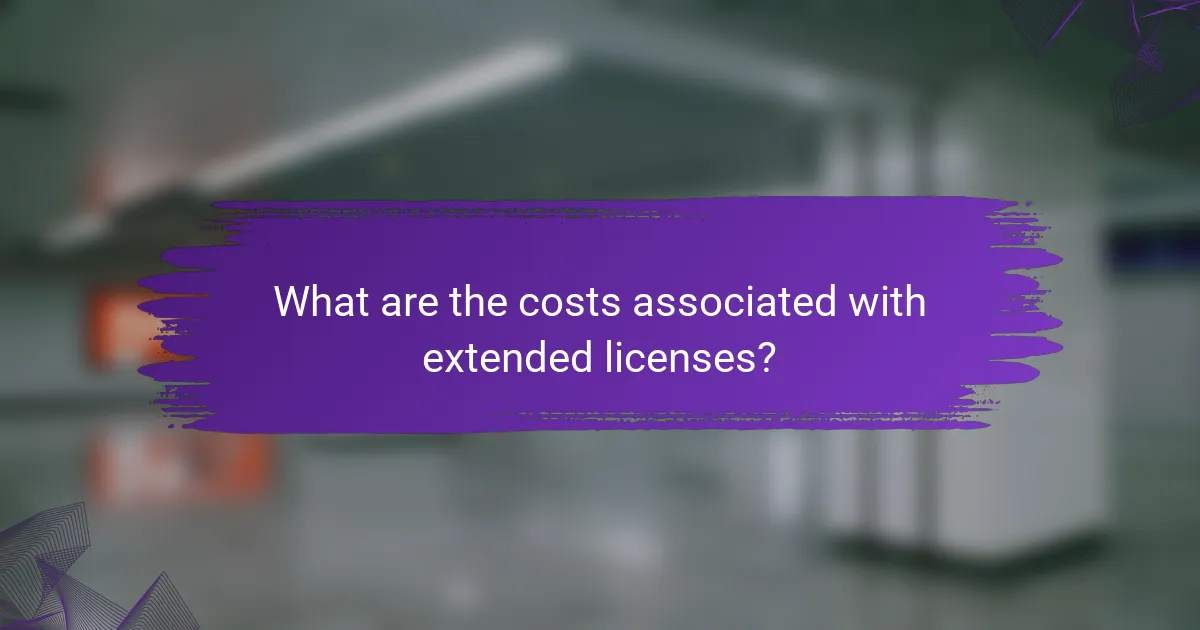
What are the costs associated with extended licenses?
The costs associated with extended licenses can vary significantly based on the provider and the specific terms of the license. Typically, these costs can range from a few hundred to several thousand dollars, depending on the usage rights and the type of content involved.
Pricing models vary by provider
Different providers offer various pricing models for extended licenses, which can include one-time fees, subscription-based payments, or tiered pricing based on usage. For instance, some platforms may charge a flat rate for unlimited use, while others might have a pay-per-use structure. Understanding these models is crucial for selecting the best option for your needs.
Additionally, some providers may offer discounts for bulk purchases or long-term commitments, which can be beneficial if you plan to use multiple licenses over time.
Factors influencing costs
Several factors can influence the costs of extended licenses, including the type of content, the scope of usage, and the duration of the license. For example, licenses for high-demand content or exclusive rights tend to be more expensive than those for standard materials.
Geographic location can also play a role; licenses may differ in price based on regional market conditions or local regulations. Always consider these factors when budgeting for extended licenses.
Comparison of popular platforms
When comparing popular platforms for extended licenses, it’s essential to look at both the pricing and the specific terms offered. For example, Adobe Stock and Shutterstock may have different pricing structures and content availability, which can affect your overall costs.
| Platform | Starting Price | License Type |
|---|---|---|
| Adobe Stock | USD 199 | Extended License |
| Shutterstock | USD 249 | Enhanced License |
| iStock | USD 150 | Extended License |
Reviewing these options can help you make an informed decision based on your budget and content needs.
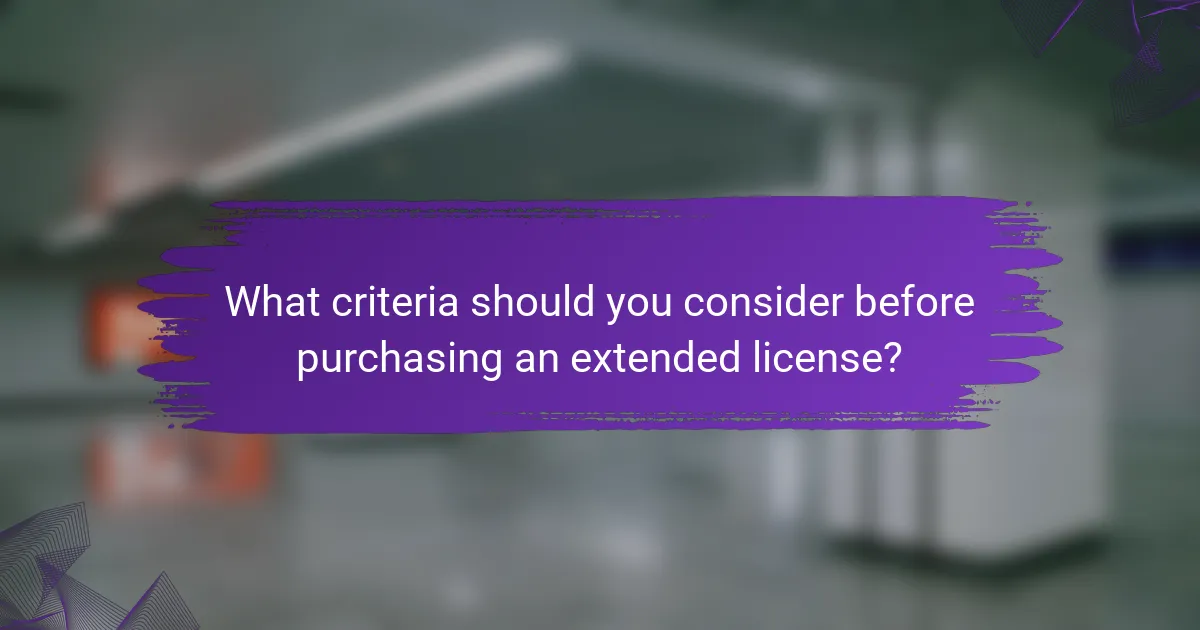
What criteria should you consider before purchasing an extended license?
Before purchasing an extended license, consider the specific needs of your project, your budget, and the type of content you intend to use. These factors will help determine whether an extended license is necessary and beneficial for your situation.
Project scope and requirements
Evaluate the scope of your project to determine if an extended license is needed. If your project involves commercial use, distribution, or significant modifications to the content, an extended license may be essential. For example, using stock images in a marketing campaign typically requires an extended license due to the commercial nature of the project.
Additionally, consider the duration and reach of your project. If you plan to use the content for a long-term campaign or across multiple platforms, an extended license can provide the necessary coverage and flexibility.
Budget constraints
Budget is a critical factor when deciding on an extended license. Extended licenses generally cost more than standard licenses, so assess whether the benefits justify the expense. For instance, if your project has a limited budget, you may need to weigh the cost of an extended license against potential revenue from the project.
It can be helpful to create a budget breakdown that includes all potential costs associated with licensing. This way, you can make an informed decision about whether to invest in an extended license or explore alternative content options.
Content type and usage
The type of content you plan to use significantly influences the need for an extended license. For example, if you are using music, video, or high-resolution images for commercial purposes, an extended license is often required. Assess the specific terms of the content provider to understand what is permissible under a standard license versus an extended one.
Furthermore, consider how you will use the content. If you intend to modify or adapt the content for different applications, an extended license may offer the necessary permissions. Always review the licensing agreement to ensure compliance with usage rights and restrictions.
